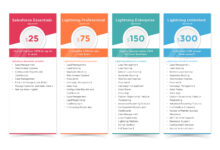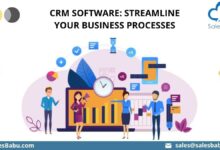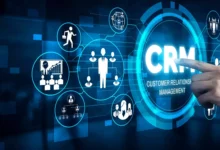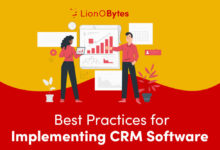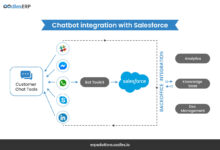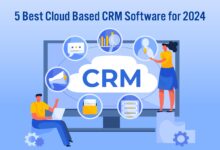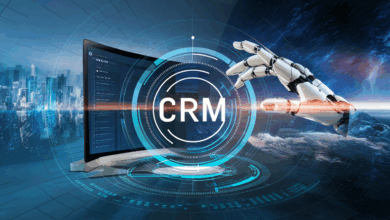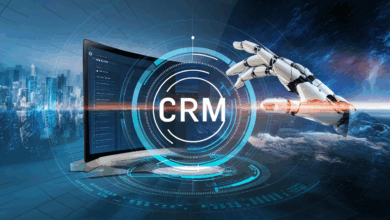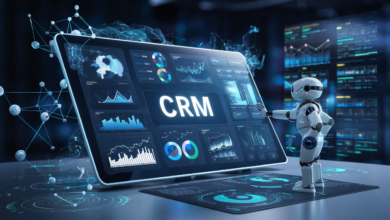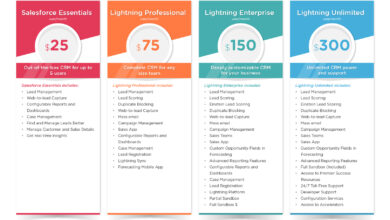Best Enterprise CRM Solutions: Enhancing Business Efficiency With Advanced Tools
Best Enterprise CRM Solutions pave the way for businesses to optimize customer relationships and streamline operations. This comprehensive guide explores the key features, benefits, and successful case studies of implementing CRM solutions tailored for large organizations.
Overview of Enterprise CRM Solutions
Customer Relationship Management (CRM) in an enterprise context refers to the strategies, processes, and technologies used by large businesses to manage and analyze customer interactions throughout the customer lifecycle. It aims to improve customer relationships, drive sales growth, and enhance customer satisfaction.
CRM solutions are crucial for large businesses as they help streamline and automate sales, marketing, and customer service processes. By centralizing customer data and interactions, enterprise CRM solutions enable organizations to better understand their customers, personalize interactions, and make data-driven decisions.
Key Features and Functionalities of Enterprise CRM Solutions
- Centralized Customer Database: Store and manage all customer information, interactions, and transactions in one place for easy access and analysis.
- Sales Automation: Automate sales processes, such as lead management, opportunity tracking, and quote generation, to improve efficiency and productivity.
- Marketing Automation: Create and execute targeted marketing campaigns, track campaign performance, and analyze customer engagement to optimize marketing efforts.
- Customer Service Management: Provide a unified view of customer interactions across various channels, enable efficient ticket management, and track customer satisfaction levels.
- Analytics and Reporting: Generate detailed reports, analyze key performance indicators, and gain insights into customer behavior and trends to make informed business decisions.
- Integration Capabilities: Seamlessly integrate with other business systems, such as ERP and accounting software, to ensure data consistency and workflow automation.
Top Features to Look for in Enterprise CRM Solutions
When choosing a CRM solution for enterprise use, it is crucial to consider the features that will best suit the needs of a large organization. Here are some key features to look for:
Customization Options
Customization options are essential for large organizations as they allow the CRM solution to be tailored to specific business processes and requirements. Features such as customizable fields, workflows, and dashboards can help streamline operations and ensure that the CRM system aligns with the unique needs of the organization.
Integration Capabilities
Integration capabilities are another important feature to consider when selecting an enterprise CRM solution. The ability to seamlessly integrate with other business systems, such as marketing automation tools, ERP software, and customer support platforms, can help improve data visibility and streamline processes across the organization. Look for CRM solutions that offer robust integration options and support for popular third-party applications.
Case Studies of Successful Implementation
Implementing enterprise CRM solutions can have a profound impact on a company’s operations, customer relationships, and overall productivity. Let’s explore some examples of companies that have successfully integrated CRM into their business processes.
Company A: Streamlining Customer Interactions
Company A, a leading telecommunications provider, implemented an enterprise CRM solution to streamline their customer interactions. By centralizing customer data and communication channels, they were able to provide more personalized service and targeted marketing campaigns. This resulted in a significant increase in customer satisfaction and retention rates.
Company B: Improving Sales Performance
Company B, a global manufacturing company, faced challenges in tracking and managing sales leads efficiently. After implementing an enterprise CRM solution, they were able to automate lead generation, track sales performance in real-time, and analyze customer behavior patterns. This led to a substantial improvement in their sales conversion rates and revenue growth.
Company C: Enhancing Operational Efficiency
Company C, a retail chain with multiple locations, struggled with coordinating inventory management and customer service across all stores. By integrating an enterprise CRM solution, they were able to synchronize inventory data, optimize supply chain logistics, and provide seamless customer service experiences. This resulted in reduced operational costs and improved overall efficiency.
Scalability and Flexibility in CRM Solutions
In the realm of enterprise CRM solutions, scalability and flexibility play a crucial role in ensuring the software can adapt to the changing needs of a growing business. Let’s delve deeper into why these aspects are important and how they can benefit organizations.
Adaptability to Business Growth
One of the key advantages of a CRM system with scalability and flexibility is its ability to grow alongside the business. As companies expand, their requirements evolve, and a robust CRM solution should be able to accommodate these changes seamlessly. For example, a scalable CRM system can handle an increasing volume of customer data, transactions, and interactions without compromising performance or efficiency.
Customization Capabilities
Flexibility in CRM solutions allows businesses to customize the software according to their specific needs and processes. Whether it’s creating custom fields, workflows, or reports, a flexible CRM system empowers organizations to tailor the platform to suit their unique requirements. This level of customization ensures that the CRM solution aligns perfectly with the business objectives and operational workflows.
Role of Cloud-Based CRM Solutions
Cloud-based CRM solutions have revolutionized the scalability and flexibility of CRM systems. By leveraging the cloud, organizations can easily scale their CRM infrastructure based on demand, without the need for significant upfront investments in hardware or software upgrades. This scalability allows businesses to adapt to fluctuations in user numbers, data storage requirements, and other variables without constraints.
Security and Compliance Considerations
In today’s digital age, security and compliance are crucial aspects that every enterprise CRM solution must address to protect sensitive data and ensure adherence to regulations.
Security Features in Enterprise CRM Solutions
- Role-based access controls: Enterprise CRM solutions should offer granular control over user permissions to restrict access to sensitive data based on roles and responsibilities.
- Data encryption: All data stored in the CRM system, including customer information and communication logs, should be encrypted to prevent unauthorized access or data breaches.
- Audit trails: The system should maintain detailed audit logs that track user activities, changes to data, and system access to ensure accountability and traceability.
- Two-factor authentication: Implementing multi-factor authentication adds an extra layer of security by requiring users to verify their identity through a second method, such as a mobile device or biometric data.
Compliance Requirements and CRM Systems
- GDPR compliance: Enterprise CRM solutions need to support compliance with regulations such as the General Data Protection Regulation (GDPR) by enabling data protection features like consent management and data portability.
- HIPAA compliance: For healthcare organizations, CRM systems should adhere to the Health Insurance Portability and Accountability Act (HIPAA) regulations to safeguard patient health information.
- PCI DSS compliance: Organizations handling payment card information must ensure their CRM systems comply with the Payment Card Industry Data Security Standard (PCI DSS) to protect cardholder data.
Importance of Data Encryption and Secure Access Controls
-
Data encryption ensures that sensitive data stored in the CRM system remains protected from unauthorized access, reducing the risk of data breaches and ensuring confidentiality.
-
Secure access controls, such as role-based permissions and multi-factor authentication, help prevent unauthorized users from accessing sensitive information, enhancing overall system security.
Integration with Other Business Systems
In today’s interconnected business environment, integrating CRM solutions with other business systems like ERP or marketing automation can bring numerous benefits. This seamless integration can streamline processes, improve data accuracy, and provide a holistic view of customer interactions across various touchpoints.
Benefits of Integration
- Enhanced Data Visibility: Integrating CRM with ERP systems allows for a comprehensive view of customer data, transactions, and interactions in one centralized location.
- Improved Efficiency: Automation of data transfer between systems reduces manual data entry errors and saves time for employees.
- Better Decision-Making: Access to real-time data from different systems enables informed decision-making and personalized customer experiences.
Examples of Seamless Integration
- Integration of CRM with marketing automation tools enables targeted marketing campaigns based on customer behavior and preferences.
- CRM integration with ERP systems ensures a smooth flow of information from sales to order fulfillment, improving order accuracy and delivery times.
Challenges and Solutions
- Data Synchronization Issues: Ensure proper mapping of data fields between systems and implement regular data sync processes to maintain data integrity.
- Compatibility Problems: Choose CRM solutions and integration tools that are compatible with existing systems and offer robust APIs for seamless integration.
- User Adoption Challenges: Provide adequate training and support to employees to encourage adoption of integrated systems and maximize their benefits.
Customer Support and Training
Customer support and training play a crucial role in the successful implementation and utilization of enterprise CRM solutions. Robust support services and comprehensive training programs are essential for ensuring that companies can fully leverage the capabilities of their CRM systems.
Customer Support Options
- 24/7 Helpline: Having access to round-the-clock customer support can help businesses address any issues or concerns promptly, ensuring minimal disruptions to operations.
- Dedicated Account Managers: Some CRM providers offer dedicated account managers who work closely with businesses to understand their needs and provide personalized support and guidance.
- Online Support Resources: Access to online knowledge bases, FAQs, and user forums can also be valuable for users seeking self-help options and quick solutions to common queries.
Training Programs
Comprehensive training programs are essential for maximizing CRM utilization and ensuring that employees are proficient in using the system effectively. Training programs may include:
- On-site Training: In-person training sessions conducted at the company’s premises can be beneficial for hands-on learning and immediate feedback.
- Online Training Modules: Interactive online modules and video tutorials can provide flexibility for employees to learn at their own pace and convenience.
- Certification Programs: Some CRM providers offer certification programs to validate employees’ skills and knowledge, enhancing their proficiency in utilizing the CRM system.
User Interface and User Experience Design
In the realm of Enterprise CRM Solutions, the user interface (UI) and user experience (UX) design play a crucial role in determining the success of the system. A well-thought-out UI/UX design can greatly enhance user adoption, efficiency, and overall productivity within an organization.
Intuitive UI Features for Enhanced User Experience
- Simple and Clean Layout: An uncluttered interface with intuitive navigation menus and clearly labeled buttons can make it easy for users to find what they need.
- Customizable Dashboards: Allowing users to personalize their dashboards with frequently accessed data and reports can improve efficiency and user satisfaction.
- Drag-and-Drop Functionality: The ability to easily drag and drop elements within the CRM system for quick data entry or customization can streamline user workflows.
- Contextual Help and Tooltips: Providing contextual help options and tooltips can guide users through unfamiliar features or processes, reducing the learning curve.
Impact of Well-Designed UI/UX on Productivity
A well-designed user experience can significantly impact the overall productivity and efficiency of an organization by:
- Reducing Training Time: Intuitive design elements can minimize the need for extensive training, allowing users to quickly grasp the system and start using it effectively.
- Enhancing User Adoption: A user-friendly interface encourages higher adoption rates among employees, leading to increased utilization of the CRM system and better data management.
- Improving Data Accessibility: Intuitive navigation and search functionalities enable users to access relevant data quickly, enhancing decision-making processes and response times.
- Boosting Employee Satisfaction: A seamless user experience can boost employee morale and satisfaction, leading to higher engagement and better performance.
Reporting and Analytics Capabilities
Robust reporting and analytics capabilities are essential components of enterprise CRM solutions as they provide valuable insights into customer interactions, sales performance, marketing campaigns, and overall business operations. These tools enable organizations to track key metrics, identify trends, and make data-driven decisions to optimize their strategies and improve customer relationships.
Types of Reports and Analytics
- Standard Reports: Pre-built reports that offer basic insights into sales, marketing, and customer service metrics.
- Custom Reports: Tailored reports that can be created to analyze specific data points or KPIs based on unique business requirements.
- Real-time Dashboards: Interactive dashboards that display live data visualizations for quick decision-making.
- Predictive Analytics: Advanced analytics tools that forecast future trends and outcomes based on historical data patterns.
Comparison of Reporting Capabilities
| CRM Solution | Reporting Features |
|---|---|
| Salesforce | Offers a wide range of pre-built and customizable reports, real-time dashboards, and AI-powered analytics. |
| Microsoft Dynamics 365 | Provides interactive dashboards, customizable reports, and integration with Power BI for advanced analytics. |
| HubSpot CRM | Focuses on user-friendly reporting tools, custom report creation, and pipeline forecasting. |
Mobile Accessibility and Offline Capabilities
Mobile accessibility has become a crucial aspect of modern CRM solutions, allowing users to access important customer data and collaborate with team members on-the-go. In today’s fast-paced business environment, having the ability to access CRM systems from mobile devices is essential for staying connected and productive.
Offline capabilities in CRM solutions are especially valuable for sales teams who frequently work in remote areas or have limited connectivity. These features enable users to continue working and inputting data even when offline, ensuring that important information is not lost and productivity is not hindered by a lack of internet access.
Features Enhancing Mobile User Experience
- Mobile-responsive design: CRM applications that adapt to different screen sizes and devices, providing a seamless user experience.
- Mobile app availability: Dedicated mobile applications that offer optimized functionality for smartphone and tablet users.
- Offline data sync: Ability to sync data automatically once the device is back online, ensuring data integrity and continuity of work.
- Mobile notifications: Instant alerts and reminders to keep users informed about important updates and tasks.
Cost Considerations and ROI Analysis
Implementing enterprise CRM solutions involves various cost factors that organizations need to consider. These costs may include software licensing fees, implementation and customization costs, training expenses, and ongoing maintenance and support fees. It is essential for businesses to conduct a thorough cost analysis to understand the financial implications of adopting a CRM system.
Calculating Return on Investment (ROI)
- ROI = (Net Profit from Investment – Cost of Investment) / Cost of Investment
- Consider factors such as increased sales revenue, improved customer retention, reduced marketing costs, and enhanced productivity when calculating ROI.
- Track key performance indicators (KPIs) before and after CRM implementation to measure the impact on business operations.
Long-term Benefits and Cost Savings
- A well-implemented CRM solution can lead to increased efficiency, streamlined processes, and better customer insights, resulting in long-term cost savings.
- Automation of tasks, personalized marketing campaigns, and improved customer service can contribute to revenue growth and profitability over time.
- Reduced manual data entry, optimized sales processes, and targeted lead generation can help organizations achieve a competitive edge in the market.
Concluding Remarks
In conclusion, Best Enterprise CRM Solutions offer a robust framework for businesses to drive growth, improve customer interactions, and boost overall productivity. By leveraging advanced tools and features, companies can stay competitive in today’s dynamic market landscape.
